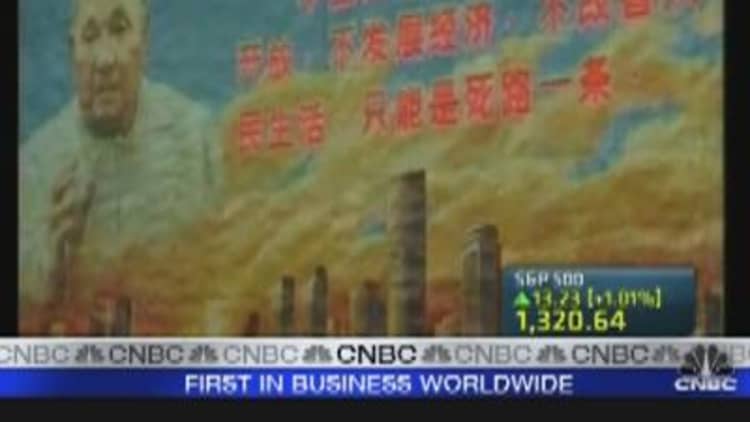China's ruling Communist Party celebrates 9 decades at the helm on Fridayand can be happy about several things. Double-digit growth over the last decade has made China's economy the world's second-largest after the U.S. China is also the manufacturing capital of the world with the Made in China label endorsing almost everything from toys to cars.
But the economic miracle has also been criticized for being state sponsored, with private enterprise being subject to the heavy hand of the government.
"Any party that stays in power by controlling the media, determining what is sold in bookshops and pushing religion underground all the while not allowing free elections - if you call that successful, maybe, but I don't really call that good for the Chinese people," Sean King, Vice President, Park Strategies told CNBC. Click here for full interview.
Others say issues such as freedom of speech are not a major concern at this stage of China's economic development, where it is trying to become a "middle income economy,”
"Being a middle income economy doesn't require freedom of speech or intellectual capital necessarily, you've just got to improve the standard of living, get the basic infrastructure in place,” says Paul Donovan, Managing Director and Deputy Head of Global Economics at UBS Investment Bank.
On that front, China has delivered the goods.
“Clearly….for the past 30 years the party has been extraordinarily successful in delivering economic benefits to its people, and it has been successful in lifting hundreds of millions out of poverty," says Nicholas Consonery, China Analyst at Eurasia Group. Click here for full interview.
But the recent social unrest could signal the beginning of the end for China's economic model, according to some.
The top-down model works in the early stages of economic development, says Donovan “because it is simply a case of mobilizing physical resources, getting everything in place in order to provide the capital so people can move up to the next level.”
But Beijing will have to start giving up some of that control as it moves to the next stage of development. "The problem for a country like China is once you've got to somewhere between $5,000 and $15,000 per person per year, in terms of GDP, the next level isn't led by the state."
China's per capita GDP in 2010 was $4,400, which means the country may soon have to rethink strategy. Says Donovan, “Innovation is what drives growth to the next level, and innovation is quite difficult to achieve if you've got an authoritarian regime."

China’s authoritarian approach though, got a shot in the arm during the recent financial crisis, when the country managed to post growth rates of 9 percent. Consonery says the crisis reinforced Beijing's view that using state owned enterprises to drive the economy is a successful approach especially in times of international instability.
But now China faces a complex situation - it needs to keep its economic momentumgoing while keeping a lid on inflation, even as the world goes through an economic soft patch.
China is trying to engineer a shift from an investment led economy to a consumption led one. But Donald Straszheim of the ISI Group says China's fast aging population could pose a huge problem as it makes that shift.
"People who are older tend to spend less and save more than people who are younger. So this whole tendency to try and get people to spend more - that is rebalance the economy and the consumer sector - is being resisted by the general population who wants to save more and spend less to take care of themselves," says Straszheim.
A big transition point will come next year when both Premier Wen Jiabao and President Hu Jintao step down.
"There's going to be this massive turnover in leadership. It is really historically unprecedented. A lot of our projections about where China is headed depend on how this whole thing plays out," says Consonery.

